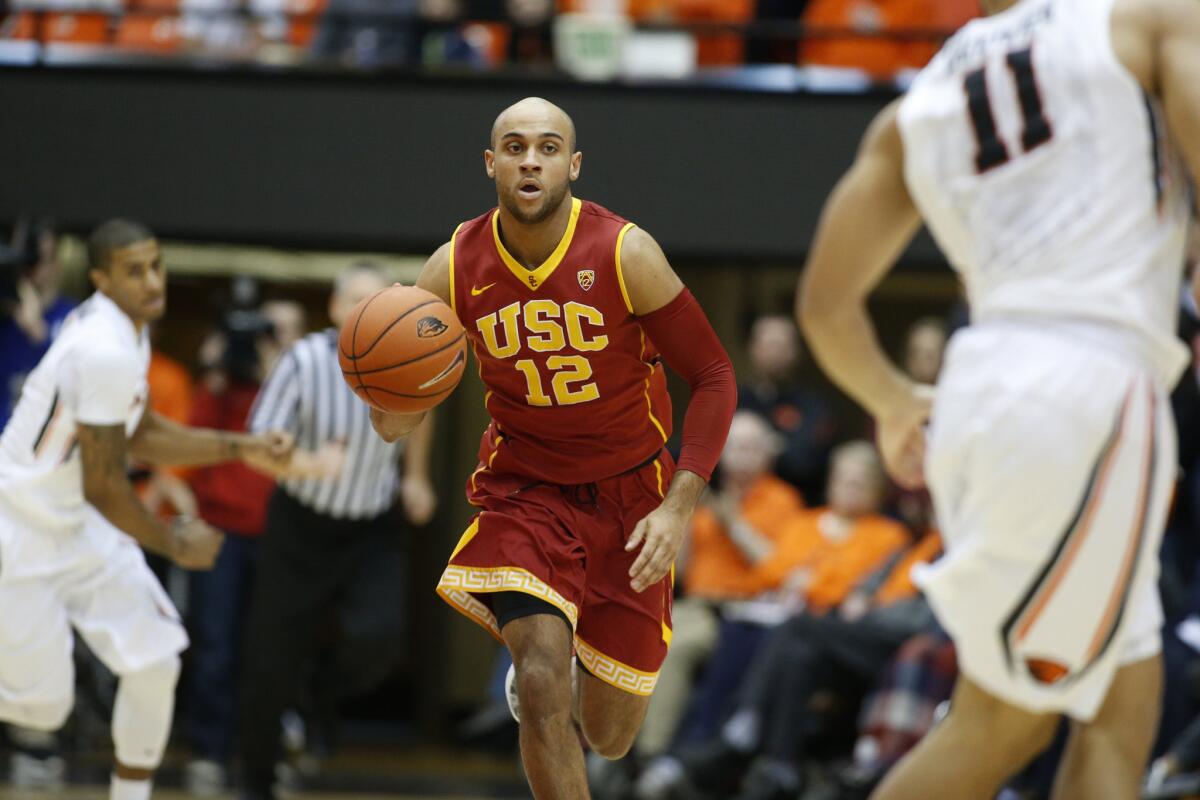USC uses its earlier collapse as incentive for Washington game Saturday

USC guard Julian Jacobs dribbles up the court during a game against Oregon State on Jan. 24.
The game was USC’s. Earlier this month, it led Washington by 22 points. The Trojans looked hungry. The Huskies looked lifeless.
Then USC guard Julian Jacobs turned an ankle, and the Trojans fell apart. Washington enjoyed a huge comeback win.
The Trojans and Huskies meet again on Saturday at the Galen Center, and for USC it will be a chance to ease the sting of its collapse in Seattle.
“It’s a big game,” guard Katin Reinhardt said. “We felt like we should’ve won that game.”
The first game turned when Jacobs left with the ankle injury. USC’s lead was in the 20s midway through the second half. When Jacobs departed, the Trojans cracked under the Huskies’ pressure.
Jacobs’ injury “was probably the defining moment for their team,” Washington guard Andrew Andrews said afterward.
Washington won, 87-85, on a last-second put-back.
The defeat did not linger for USC, now 16-5 overall, 5-3 in Pac-12 Conference play. The Trojans won their next three games, perhaps their best stretch of the season.
But the loss in Seattle hurt. Afterward, players fumed in the locker room. Some called it their worst loss all season.
“Now we’ve got a chance to get them back,” Reinhardt said.
Washington (14-6, 6-2) has used the victory as a springboard. It has thrived in close games. The Huskies are tied for first place in the Pac-12, despite being outscored by a total of 10 points in conference play. Three of their games have gone to overtime.
Coach Lorenzo Romar told the Tacoma News Tribune that USC was the best team his Huskies had played all season.
Romar was asked whether he thought USC had improved since the first meeting.
“If they improved from the time we played them,” Romar said, “they might win a national championship.”
UCLA experiment over?
UCLA harbored grand plans for its two forwards at the beginning of the season. Tony Parker and Thomas Welsh were each big, imposing presences inside.
The Bruins typically used them in the same rotation, hoping the offensive mismatches they created and the extra offensive rebounds they corralled would outweigh defensive concerns.
UCLA stuck with the strategy even when smaller lineups gave the Bruins fits on defense.
But on Thursday, Coach Steve Alford said he’ll consider ending the experiment.
“It’s not working,” he said after UCLA’s 86-84 loss to Washington. “We’re slow. We’re not reacting to things.”
A change would be tricky. Parker has been one of UCLA’s best weapons on offense. Few teams have had an answer for him in the post.
Welsh has shown significant progress in his second season. At 7 feet, he is UCLA’s tallest player, and his midrange game has become an important part of UCLA’s offense.
Benching either would require a sacrifice. But Alford liked what he saw when Jonah Bolden, a more versatile forward, played extra minutes on Thursday, mostly at the expense of Welsh, who got into foul trouble.
“I’m starting to feel comfortable out there,” Bolden said.
With Bolden on the floor, UCLA got to more loose balls. Alford said UCLA was “much more athletic.”
He added: “We’re going to have to take a long look at that as well, because I think when we’re big-big as much as we are we’re just not reacting, and we’re not as athletic and quick as I’d like to be.”
Follow Zach Helfand on Twitter @zhelfand
More to Read
Go beyond the scoreboard
Get the latest on L.A.'s teams in the daily Sports Report newsletter.
You may occasionally receive promotional content from the Los Angeles Times.











